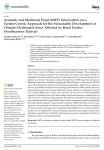Gammoudi T., Besser H., Chaieb A., Abdelli F., Mahjoubi A., Nardi F. (2025). Aromatic and Medicinal Plant (AMP) valorization via a farmer-centric approach for the sustainable development of climate-challenged areas affected by rural exodus (Southeastern Tunisia). Sustainability, 02/09/2025, vol. 17, n. 18, p. 8494.
https://doi.org/10.3390/su17188494
https://doi.org/10.3390/su17188494
| Titre : | Aromatic and Medicinal Plant (AMP) valorization via a farmer-centric approach for the sustainable development of climate-challenged areas affected by rural exodus (Southeastern Tunisia) (2025) |
| Auteurs : | T. Gammoudi ; H. Besser ; A. Chaieb ; F. Abdelli ; A. Mahjoubi ; F. Nardi |
| Type de document : | Article |
| Dans : | Sustainability (vol. 17, n. 18, September 2025) |
| Article en page(s) : | p. 8494 |
| Langues : | Anglais |
| Langues du résumé : | Anglais |
| Catégories : |
Catégories principales 05 - DEVELOPPEMENT RURAL ; 5.1 - DéveloppementThésaurus IAMM DEVELOPPEMENT DURABLE ; ZONE DEFAVORISEE ; ZONE ARIDE ; PLANTE A HUILES ESSENTIELLES ; PLANTE MEDICINALE ; TUNISIE |
| Résumé : | The valorization of local plant cover, particularly through the integration of indigenous knowledge, is central to Tunisia's economic development strategies. These approaches focus on diversifying agriculture by enhancing local natural and cultural heritage to strengthen community resilience amid environmental and socio-economic changes and to address rural exodus. This study examines the feasibility of AMP-based micro-projects in Matmata (southeastern Tunisia) by applying the Water-Energy-Food-Ecosystem (WEFE) nexus and participatory methods involving local stakeholders. Field surveys, literature reviews, and statistical analyses reveal growing youth interest in AMP ventures, driven by rising pharmaceutical and cosmetic demand. Economic viability is confirmed by internal rate of return (IRR) values of 32%, 28%, and 43%, all well above the 10% profitability threshold. Profitability index (PI) values indicate efficient investments, yielding returns of 2.64, 2.13, and 5.31 dinars per dinar invested. The initiatives also deliver socio-cultural and environmental benefits through WEFE-based resource management. Beyond profitability, the study identifies gaps and opportunities to enhance AMP biodiversity, resource management, and sustainable diversification in southern Tunisia. Further efforts are required to increase market value and ensure equitable benefit distribution. Government policies should focus on raising WEFE awareness, building capacity, and investing in climate-smart agriculture, especially in vulnerable, migration-prone regions, supported by reforms in financing, taxation, and spatial planning. |
| Cote : | En ligne |
| URL / DOI : | https://doi.org/10.3390/su17188494 |







